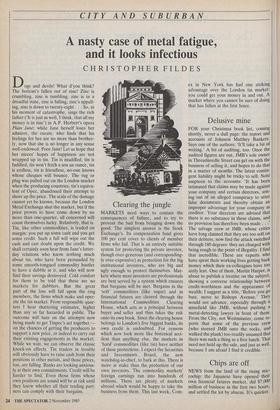CITY AND SUBURBAN
A nasty case of metal fatigue, and it looks infectious
CHRISTOPHER FILDES
Dogs and devils! What d'you think? The bottom's fallen out of zinc! Zinc is crumbling, zinc is tumbling, zinc is in a dreadful state, zinc is falling, zinc's appall- ing, zinc is down to twenty-eight . . . So, in his moment of catastrophe, sings the rich father (`It is just as well, I think, that all my money is in zinc') in A.P. Herbert's opera Plain Jane; while Jane herself loses her admirer, the curate, who finds that his feelings for her are no more than brother- ly, now that she is no longer in any sense well-endowed. Poor Jane! Let us hope that her nieces' hopes of happiness are not wrapped up in tin. Tin is muddled, tin is fuddled, tin won't fetch a sou an ounce, tin is endless, tin is friendless, no-one knows whose cheques will bounce. The rug or plug was pulled out on the London market when the producing countries, tin's equiva- lent of Opec, abandoned their attempt to shore up the price. The scale of the damage cannot yet be known, because the London Metal Exchange shut the market, but if the price proves to have come down by no more than one-quarter, all concerned will count themselves lucky. Relatively, that is. Tin, like other commodities, is traded on margin: you put up some cash and you get some credit. Such a fall will wipe out the cash and cast doubt upon the credit. We shall certainly soon hear from Jane's latter- day relations who know nothing much about tin, who have been persuaded by some smooth-tongued commodity hustler to have a dabble in it, and who will now find their savings destroyed. Cold comfort for them to be told that these are no markets for dabblers. But the great part of the loss will fall upon the ring members, the firms which make and oper- ate the tin market. From responsible quar- ters I hear shattering estimates, higher than any so far hazarded in public. The outcome will turn on the attempts now being made to get Tinpec's act together on the chances of getting the producers to support a new price, or indeed to carry out their existing engagements in the market. While we wait, we can observe the classic knock-on effects. Tin traders in trouble will obviously have to raise cash from their positions in other metals, and those prices, too, are falling. Banks are looking anxious- ly at their own commitments. Credit will be harder to find. Even those firms whose own positions are sound will be at risk until they know whether all their trading part- ners can comply with their bargains.






















































 Previous page
Previous page